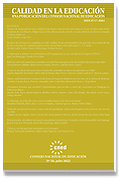Double-Edged Leadership: Headteachers in Early Childhood Education
DOI:
https://doi.org/10.31619/caledu.n56.1189Keywords:
female leadership, gender, feminism, headteachers, early childhood education, kindergartenAbstract
The field of educational leadership research has been predominantly focused on school leadership. However, despite the distinctive characteristics of early childhood education, there is limited understanding of educational leadership at this level. Moreover, leadership has been conventionally studied from a traditional masculine perspective, despite the emergence of research literature in issues of female leadership. In this context, the study reported here sought to investigate, from a gender perspective, everyday practices of kindergarten-level headteachers and level coordinators in schools. This qualitative study is based on 24 in-depth interviews with early childhood education headteachers and school level coordinators. In addition, a job shadowing-based technique was carried out to follow the work of six participants over a working week, followed by closing interviews. The results of the study suggest that a leadership of well-being prevails among the participants, which is consistent with their professional ethics. Although this style can enhance their professional identity, from a gender perspective the research outcomes illustrate that this style has a double-edged dimension. The authors warn against the risk of uncritically praising "female leadership" and illustrate the tensions that can arise from perpetuating gender stereotypes. From an ethic of feminist care, the paper concludes proposing challenges in this field of educational leadership.
Downloads
Published
Issue
Section
License
Authors retain their Copyright and only transfer a part of these to the journal, accepting the following conditions:
Authors keep their rights as authors and guarantee the right to the journal for the first publication of their work, which is simultaneously subject to the Creative Commons Attribution license allowing third parties to share the study accrediting the author and first publication in this journal.
Authors may adopt other non-exclusive license agreements for distribution of the version of the published work (e.g. inclusion in an institutional thematic file or publication in a monographic volume) accrediting initial publication in this journal.
Authors are allowed and recommended to share their work over the Internet (e.g. in institutional telematic files or their website) before and during the submission process, which may lead to interesting exchanges and increased citation of the published work. (See The effect of open access).

